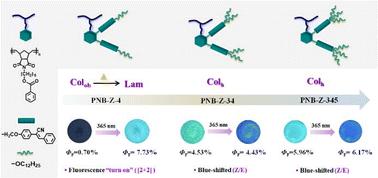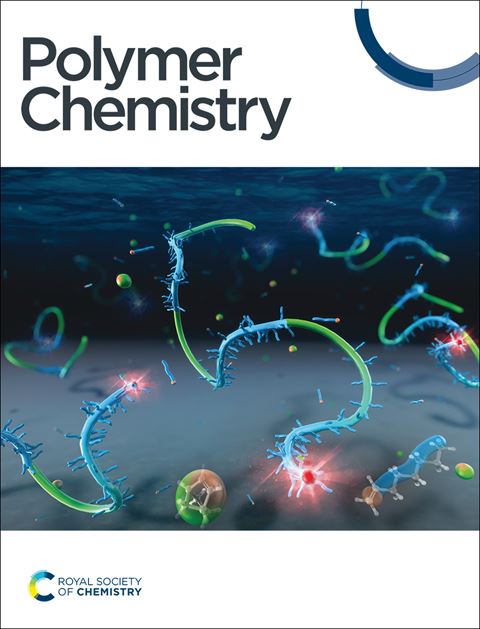Mesomorphic and photochromic luminescent behaviour of side-chain liquid crystalline polymers containing di-substituted cyanostilbene groups with different numbers of alkyl tail chains†
IF 4.1
2区 化学
Q2 POLYMER SCIENCE
引用次数: 0
Abstract
In this work, side-chain luminescent liquid crystalline polymers (SCLLCPs) that contain di-substituted cyanostilbene (CS) groups with different numbers of substituted terminal alkyl chains, namely , , and , were synthesized. Their mesomorphic structure, luminescence properties and photochromic luminescent behaviour were investigated. containing one alkyl chain in each mesogen possesses a supramolecular oblique columnar (Colob) phase with large lattice parameters, which can transform into a lamellar structure at high temperature. and with two and three alkyl tails exhibit a hexagonal columnar phase (Colh) structure. Their fluorescence quantum yields (ΦF) in the solid state are improved by increasing the number of alkyl tails as well. and exhibit aggregation-induced emission (AIE) properties, while shows weak fluorescence. Furthermore, their photochromic fluorescence responses are quite different. exhibits an obvious “turn-on” photo-responsive behaviour with ΦF increasing from 0.70% to 7.73% after UV irradiation with the existence of [2 + 2] cycloaddition, while and show Z/E isomerization induced blueshift fluorescence response.

含有不同数量烷基尾链的二取代氰基苯乙烯基团的侧链液晶聚合物的介形和光致变色发光特性
本研究合成了含有二取代氰二苯乙烯(CS)基团的侧链发光液晶聚合物(SCLLCPs),其末端烷基链的取代数目各不相同,分别为 PNB-Z-4、PNB-Z-34 和 PNB-Z-345。研究了它们的中形结构、发光特性和光致变色发光行为。PNB-Z-4的每个中生物均含有一条烷基链,具有大晶格参数的超分子斜柱状(Colob)相,在高温下可转变为片层结构。含有两条和三条烷基尾链的 PNB-Z-34 和 PNB-Z-345 呈六角柱状相(Colh)结构。它们在固态下的荧光量子产率(ΦF)也随着烷基尾数的增加而提高。PNB-Z-34 和 PNB-Z-345 显示出聚集诱导发射(AIE)特性,而 PNB-Z-4 则显示出微弱的荧光。此外,它们的光致变色荧光反应也大不相同。PNB-Z-4 表现出明显的 "开启 "光响应行为,在紫外线照射后,ΦF 从 0.70% 增加到 7.73%,存在[2+2]环加成;而 PNB-Z-34 和 PNB-Z-345 则表现出 Z/E 异构化诱导的蓝移荧光响应。
本文章由计算机程序翻译,如有差异,请以英文原文为准。
求助全文
约1分钟内获得全文
求助全文
来源期刊

Polymer Chemistry
POLYMER SCIENCE-
CiteScore
8.60
自引率
8.70%
发文量
535
审稿时长
1.7 months
期刊介绍:
Polymer Chemistry welcomes submissions in all areas of polymer science that have a strong focus on macromolecular chemistry. Manuscripts may cover a broad range of fields, yet no direct application focus is required.
 求助内容:
求助内容: 应助结果提醒方式:
应助结果提醒方式:


